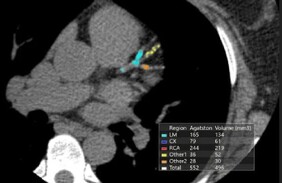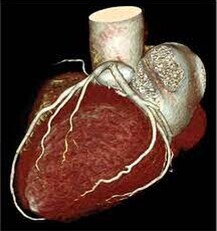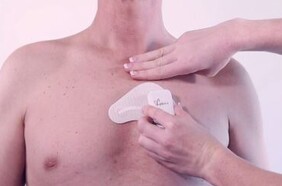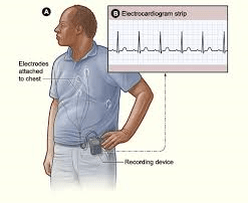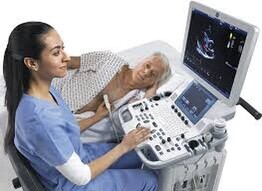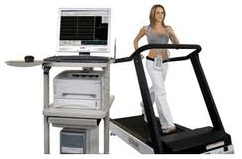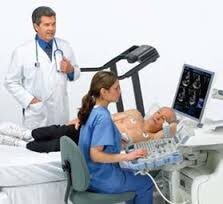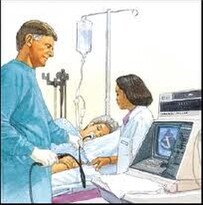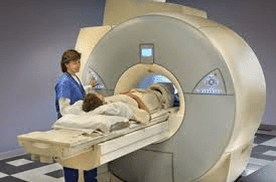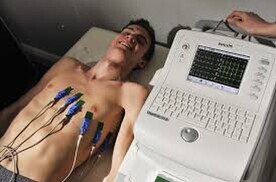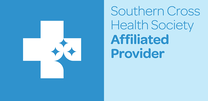CT calcium score
A calcium score helps with your decision regarding decide the need for treatment to prevent a heart attack or stroke. This investigation is most helpful for people who do not have a clear high or low risk but somewhere in the middle. A calcium score is quick and non-invasive.
Many people are offered statin therapy but are unsure as to whether they should take this medication fearing side effects. A calcium score allows patients to make a more informed decision regarding use of these medications moving forward.
If you have no symptoms and are concerned about your risk of heart attack or stroke this is the preferred investigation.
CT Coronary Angiography
CT coronary angiography offers a non-invasive way of imaging the coronary arteries. This test gives us an idea of calcium deposition within the coronary arteries and plaque formation due to fat deposition. Not only will it tell us if you have an important narrowing of a coronary artery but the knowledge of the extent of atheroma formation in the arteries will allow us to more accurately quantify your cardiovascular risk and will need for ongoing heart medications such as statins as well as plan for stent insertion if needed.
This is the preferred test for the assessment of chest pain. It cannot be used as a screening investigation for patients who do not have symptoms as it requires the administration of contrast. There is always a small risk of allergic reactions to contrast and this is not an acceptable risk of you have no symptoms. Calcium scoring is used in these cases.
In addition to the standard cardiac heart monitor described above we now offering the patch Holter monitoring system. This light weight wearable device, offers more freedom for continue with your day-to-day activities. It is light weight easier to use waterproof and can be worn for up to 7 days. In times where it is necessary to reduce contact it can be posted to you and fitted yourself using the link to the attached guide and video.
24 Hour ECG Recording (‘Holter’)
Symptoms of palpitations or awareness of the heartbeat are extremely common but usually only occur occasionally. A simple resting ECG will often not ‘catch’ the rhythm of the heart whilst the patient has symptoms. In this situation we will often suggest the fitting of a 24-hour ECG recorder. This lightweight device (about the size of a small iPOD) records the heartbeat continuously for 24 hours and provides valuable information about the basic rhythm of the heart as well as the rhythm at the time of symptoms. Sometimes palpitation symptoms are very elusive and typically disappear for the 24 hours of recording! In this situation a longer period of recording (’7-day event recorder’) or the supply of small device you carry with you and activate at the time of symptoms (‘event recorder’) may be recommended.
Echocardiogram (echo)
Using the latest echocardiography machines state of the art images can be obtained of the heart. Echocardiography uses ultrasound (same as is used to exam pregnant mothers) to image the heart. The patient is awake and is able to view the images on their own personal monitor if they wish. It is necessary to remove the top half of your clothing and the study takes about half an hour.
Key Benefits
Detect problems with the heart valves
Detect congenital heart disease
Give information about the size and function of the heart chambers (ventricles)
Exercise Tolerance Test (ETT)
This was a traditional test used to assess angina but is not that accurate and not used for this anymore. It is of no use in patients who have no symptoms and are worried about their risk of heart attack or stroke. It is mostly used as a basic screening test that is mandated by licencing authorities or to see if heart rhythm problems are related to exercise. A continuous ECG is taken whilst you undergo a graded standardised exercise on a treadmill. The test starts at a leisurely pace and gradually the speed and gradient increase every three minutes. If you are on medication it is important to ask your doctor or one of our team if you should withhold your medication on the day of your test.
Southern cross insurance is the only health insurer that may mandate this investigation before more sensitive and specific investigations are funded.
Stress Echocardiography (stress echo)
Even in patients with severe narrowing of the hearts arteries (coronary artery disease) the echocardiogram and exercise test may be completely normal. In this situation however under the stress of exercise the function of the heart can become abnormal in areas of the heart where there is a problem with blood flow. Stress echo uses this fact to help us diagnose and assess symptomatic known coronary artery disease in whom CT coronary or invasive coronary assessment is not required. Following resting echocardiogram the heart is ‘stressed’ either by exercising you or with a special medicine injected into a small vein.
Trans-oesophageal echocardiography (T.O.E.)
Usually a standard echocardiogram is detailed enough to give all the information about the heart we require. Sometimes however, particularly in patients with a problem with one of the heart valves, we need to get really detailed pictures of the heart and this can be done by passing a narrow flexible tube down your throat and gullet. The tube has a tiny echo sensor built into the tip and this generates extremely detailed pictures of the heart with no interference from the lungs and ribs. This procedure is often also performed during heart valve surgery to help guide the surgeon. This test is extremely safe and you will usually only need to spend a few hours in the hospital and go home on the same day. It requires a brief general anaesthetic.
Cardiac Magnetic Resonance Imaging (MRI)
Is a safe, noninvasive test that creates detailed pictures of your organs and tissues. "Noninvasive" means that no surgery is done and no instruments are inserted into your body.
MRI uses radio waves, magnets, and a computer to create pictures of your organs and tissues. Unlike other imaging tests, MRI doesn't use ionizing radiation or carry any risk of causing cancer.
Cardiac MRI creates both still and moving pictures of your heart and major blood vessels. Doctors use cardiac MRI to get pictures of the beating heart and to look at its structure and function. These pictures can help them decide the best way to treat people who have heart problems.
Cardiac MRI is a common test. It's used to diagnose and assess many diseases and conditions.
Electrocardiogram (ECG)
This simple, painless test takes a few minutes to perform. It turns the normal electrical activity of the heart into a tracing and this can reveal a number of different cardiac conditions which affect the structure and rhythm of the heart. As it is only a single brief snapshot of the heartbeat at rest a normal ECG does not necessarily exclude important disease of the heart but it is a good start.
Patient Tests Nelson Patient Tests Nelson Patient Tests Nelson









